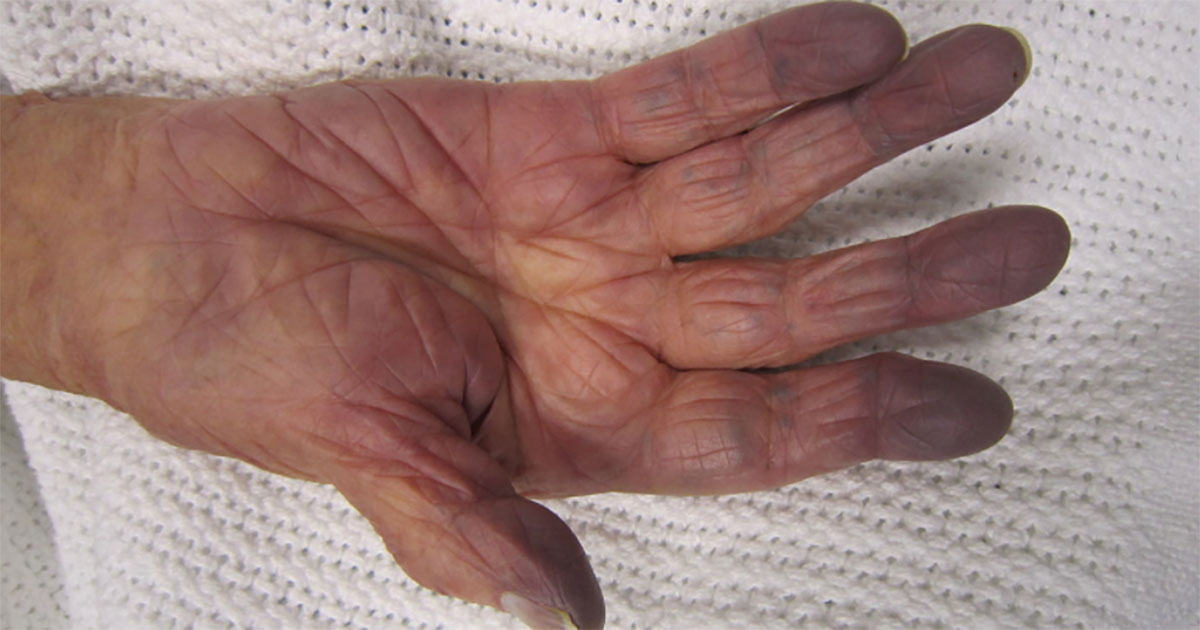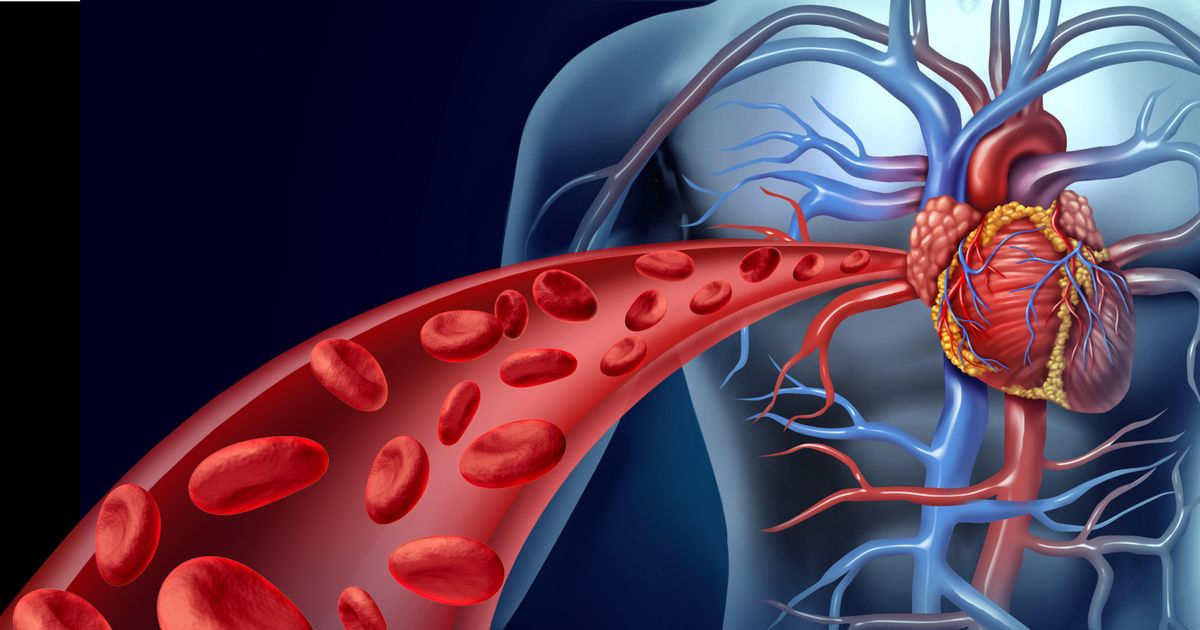Heart Murmur Signs That Could Mean Something Serious
A heart murmur is what doctors call the rushing sound of blood through the heart. Though usually asymptomatic and largely harmless, murmurs are usually caused by some fault in the valves of the heart, which can cause leaking or inefficient blood flow. Alternately, a murmur could be the result of the heart beating more rapidly than normal, which causes an excess of blood to be handled by the muscle. Most individuals with murmurs may not even know they have one. Continue reading to reveal the common signs that indicate that a patient could have a heart murmur.
Blue Lips Or Fingertips

Blue lips or fingertips are a sign of cyanosis, which is an indication of a lack of oxygen in the blood or poor blood circulation. If an individual has a heart murmur and is exhibiting signs of cyanosis, it indicates that the heart is not getting enough blood to the body’s vital organs. If this symptom is left untreated for more than three to five minutes, severe hypoxia can occur, which is a deficiency in the amount of oxygen reaching the tissues. As a result, hypoxia can cause permanent brain damage or even death.
Shortness Of Breath

Certain types of murmurs, such as those associated with the thickening or narrowing of the aortic valve in older individuals, are the result of the heart having to work harder to pump blood throughout the body. Aortic sclerosis, which is the thickening or stiffening of the aortic valve, or aortic stenosis, which is the narrowing of the aortic valve, can cause murmurs as well as shortness of breath. Trouble breathing may indicate the need for a valve replacement. Also, physical activity or exercise are common causes for rapid blood flow through the heart, which is an indicator of an innocent heart murmur as well as shortness of breath.
Sweating Without Exertion

If an individual notices heavy sweating with little to no exertion, especially coupled with a rapid heartbeat, it may be an indication that the heart is overworked and may be on the brink of failure. Excessive, unwarranted sweating often goes hand-in-hand with other symptoms of congestive heart failure. Congenital heart murmurs in children are more often associated with this type of heart failure, although acquired murmurs due to changes in the musculature of the heart can also cause these symptoms.
Swelling Of The Lungs And Liver In Children

Heart murmurs in children, whether it is innocent or abnormal, can often be much more dangerous than those in adults. Innocent heart murmurs are quite common in newborns and children, and abnormal heart murmurs are usually caused by congenital heart disease. On an X-ray or MRI, if a child appears to have an enlarged liver or lungs, it could be early symptoms of a severe heart murmur. The buildup of fluids in the organs and tissues of the body can be the result of congestive heart failure, which means the heart is not properly pumping blood throughout the body. Children with these symptoms may have cardiomyopathy, which can be fatal if left untreated.
Chest Pain
[caption id="attachment_4220" align="aligncenter" width="2119"]
Whenever an individual is experiencing chest pain, it is a sure sign that something could be seriously wrong, usually with the heart. Although it is a common misconception that chest pain always signals a heart attack, a heart murmur can also cause chest pain as well. In conditions such as aortic sclerosis and aortic stenosis, the heart has to work harder to pump blood throughout the body. Also, chest pain may signal the need for a new aortic valve. Regardless of the underlying cause, if an individual is experiencing frequent and intense chest pain, they should seek medical attention immediately to determine the cause of this symptom.
What Causes A Heart Murmur?

Heart murmurs are sounds during the heartbeat cycle that are caused by turbulent blood in or near the heart and makes a whooshing or swishing noise compared to the two beats heard with a normal heart. Heart murmurs can be present at birth, known as congenital heart defects, or can develop in a patient later in life, and can indicate an underlying heart issue.
Specifically, there are two types of heart murmurs: innocent and abnormal. A patient with an innocent murmur is considered to have a normal heart, and this type of murmur is most commonly seen in newborns and children. However, an abnormal heart murmur is more serious, as in children this form is usually caused by congenital heart disease, and in adults, it is often caused by acquired heart valve problems.
Innocent Versus Abnormal Heart Murmurs

Innocent heart murmurs occur when the blood flows more rapidly through the heart than normal. Conditions that can cause an increase in blood flow through the heart include physical activity or exercise, fever, pregnancy, anemia, hyperthyroidism, and phases of rapid growth. Thankfully, innocent heart murmurs can disappear over time or can last an entire lifetime without causing any further health complications. Abnormal heart murmurs in children, especially newborns, are caused by congenital heart defects, specifically structural problems of the heart. Common congenital defects that cause heart murmurs include holes in the heart or cardiac shunts (septal defects) and heart valve abnormalities such as stenosis or regurgitation.
Other causes of abnormal heart murmurs include infections and illnesses that damage the heart’s structure and are more commonly diagnosed in teenagers and adults. Examples of these other conditions include valve calcification or the thickening of the valves, endocarditis or an infection in the lining of the heart valves, and rheumatic fever.
Treatment Options

Fortunately, an innocent heart murmur typically does not require treatment as the heart is normal, and if the murmur is the result of an illness, such as hyperthyroidism or a fever, the murmur will often go away once the illness is treated. If a child has an abnormal heart murmur, treatment may not be necessary, but if treatment is needed, it could include medications or surgery. The medications used to treat abnormal heart murmurs depend on the specific heart problem the patient has, but include anticoagulants that prevent blood clots, diuretics, angiotensin-converting enzyme (ACE) inhibitors, statins, and beta-blockers. Surgery is also an option, especially if the patient has a damaged or leaky valve. Surgery options include valve repair or valve replacement.
Thankfully, with the right medication and careful monitoring by a physician, a heart murmur can be managed and allow the patient to go on to live a healthy life.